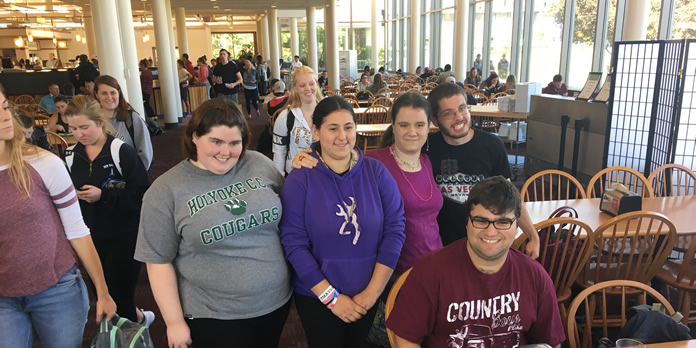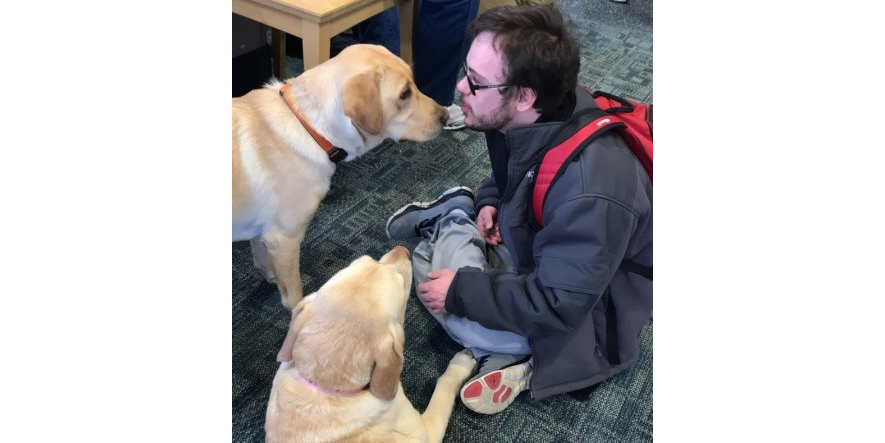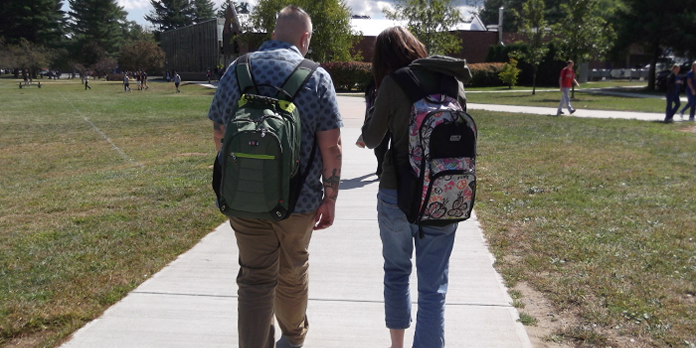
“Through MAICEI students develop a greater sense of self, increased independence, exposure to new experiences, and most importantly they see themselves as emerging adults who have the right to be a part of the ‘mainstream world.’”
—From a Superintendent (Summer 2014)
The MAICEI Program at Westfield State University opened its doors to students in September 2013. Fall 2013 enrollment began with 5. During the spring 2014 semester the program assisted in the transition of one student into adulthood and welcomed four new students solidifying the enrollment at 8 students. As the end of year 1, Westfield State University said goodbye to 3 of the 8 students as they transitioned into adulthood. Fall 2014, the start of year 2, kicked off by more than doubling enrollment from the previous year and welcomed 20 students to the campus. Five of the students returned from the previous year and 15 new students started their adventure in the MAICEI Program. The 20 students are sent from 6 partner school districts: Amherst Regional Public Schools, Chicopee Public Schools, Gateway Regional Public Schools, Ludlow Public Schools, Southwick-Tolland Regional Public Schools, and Westfield Public Schools.
For a student living in a partner school district to be eligible for MAICEI they must fit the criteria of Tier 1: between the ages of 18-21, have not passed the MCAS, have a severe intellectual disability and are receiving special education services; or Tier 2: between the ages of 18-22, who have passed the MCAS, have a diagnosis of a severe intellectual disability, and are receiving special education services until 22. Whether tier 1 or 2, students must have the ability to attend college level courses, learn to navigate the college campus, ability to adhere to the student code of conduct, and have a person-centered plan that can be heightened by the WSU MAICEI Program.
The way in which students spend their days is very individualized to each specific student. The experiences through the MAICEI program are aimed to provide students with the skills needed to meet their long-term employment goals. The goal is to locate paid employment by the end of a student’s participation in the program. Many different skills are needed to promote these opportunities; this is why at WSU we break down the skill areas into: academic, health/wellness, social/emotional, and employability as we are embracing a holistic approach to increase their overall quality of life.
Person-Centered Plan: The person-centered plan guides the selection of classes along with on campus activities and employment experiences. The person-centered plan helps student express their preferences, strengths, goals, and outcomes in the areas of employment, education, social relationships, living, and leisure. The PCP looks at person’s whole life while focusing on talents, preferences and dreams. Through the PCP choices are clarified and organized into steps for the future. One the steps are outlined all involved parties are able to assist in identifying supports and resources (disability and non-disability specific) needed to achieve their goals. A PCP is a form of a transition assessment guided by the student.
Preferences, Strength, Goals: Identified through the PCP in regards to education, employment, social, and leisure. Once identified, these areas are used to shape the student’s program plan.
WSU Program Plan: Developed with the student, district liaison, MAICEI coordinator, parent, and ed coach if applicable. The plan will identify activities that the student will do while on campus in the areas of academic, health/wellness, social/emotional, and employability. The plan will also be individualized for each student to meet their needs.
Lyndsey Nunes
Coordinator, Inclusive Concurrent Enrollment Initiative
Westfield State University
577 Western Avenue
Westfield, MA 01085
lnunes@westfield.ma.edu
(413) 572-8439
Lyndsey Nunes, MS Ed, BCBA is the MAICEI Program Coordinator at WSU. Lyndsey holds two Masters degrees from Simmons College in Boston and is currently working on her dissertation to finish her doctoral degree in Special Education from UMass Amherst. Prior to WSU she worked in a private setting in a capacity of roles: Teacher, BCBA, and Vocational Developer. Lyndsey also spent a year teaching life skills teacher in a public high school. Outside of work she provides in-home consultation for families of young adults with autism. She has presented at local and national conferences on stimulus equivalence and computer-assisted instruction. Her current research focus is self-determination of individuals with disabilities in postsecondary education settings typically between the ages of 18-22 and the perceptions of self-determination of the staff who work with the students.
“The look in his eyes on the first day of his college experience was worth.... more than I'll ever be able to describe. It's what education is all about: the suspense, the mystery, the thrill of learning. Imagine for a moment the prospect of not being included in education. That's something you and I have never given any thought to. It's an honor to teach your student. Thanks for the opportunity.”
—From a Professor (Fall 2013)

Vincent comes from the Agawam Public School district. Vincent lives at home with his mom, dad and 2 brothers. One of his greatest passions is health and fitness and he works out while on campus with the running club. He has taken several Movement Science courses, including Intro to Exercise Science. Outside of campus he is an active member of Special Olympics and loves working out in his free time as well. This semester he is enrolled in a music course and is very excited to be learning about different types of music. Vincent participates in workshops that are offered throughout out the semester that are based on several different areas including employment, social emotional, and relationships. He recently took part in filming for a video for Think College and spoke of his experiences being in the MAICEI Program at Westfield State. He was able to share what he has gone through and what he has learned about being a college student.
“I also want to thank you for introducing me to the MAICEI program because I love spending with everyone and being involved in something so amazing. I think you are doing a wonderful job and doing a wonderful thing for our campus and world.”
—From a Peer Mentor (Fall 2014)

Westfield State University is located on 256 acres in Westfield, Massachusetts, a convenient and centrally-located city in the Pioneer Valley of Western Massachusetts. The university is 10 minutes from the Mass Pike, Exit 3, and 2 hours from Boston, Providence, and Albany and about 3 hours from New York City. There are 4,800 undergraduate day students, 685 undergraduate continuing education students, and 670 graduate post-baccalaureate students. Of the 24 buildings, 10 are residence halls, one located in downtown Westfield. Westfield State University fosters intellectual curiosity, encourages critical thinking, inspires civic engagement, and promotes a global perspective. A public teaching institution offering quality programs in the liberal arts and sciences with complementing professional studies curricula, we are grounded in our founding principles of academic excellence and educating all in a diverse and welcoming community.